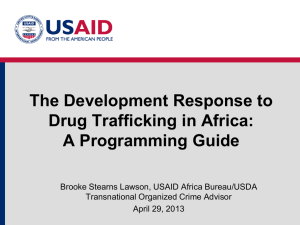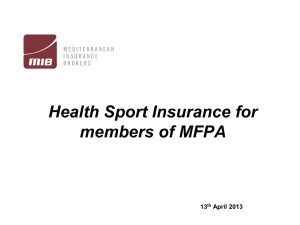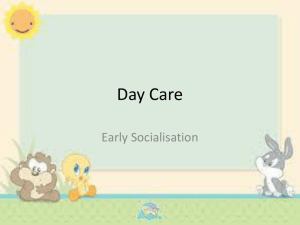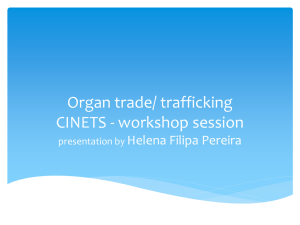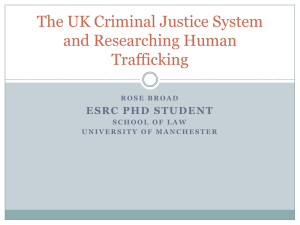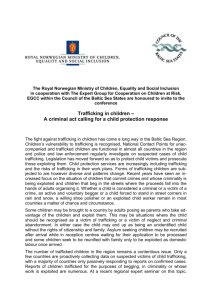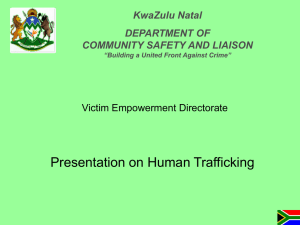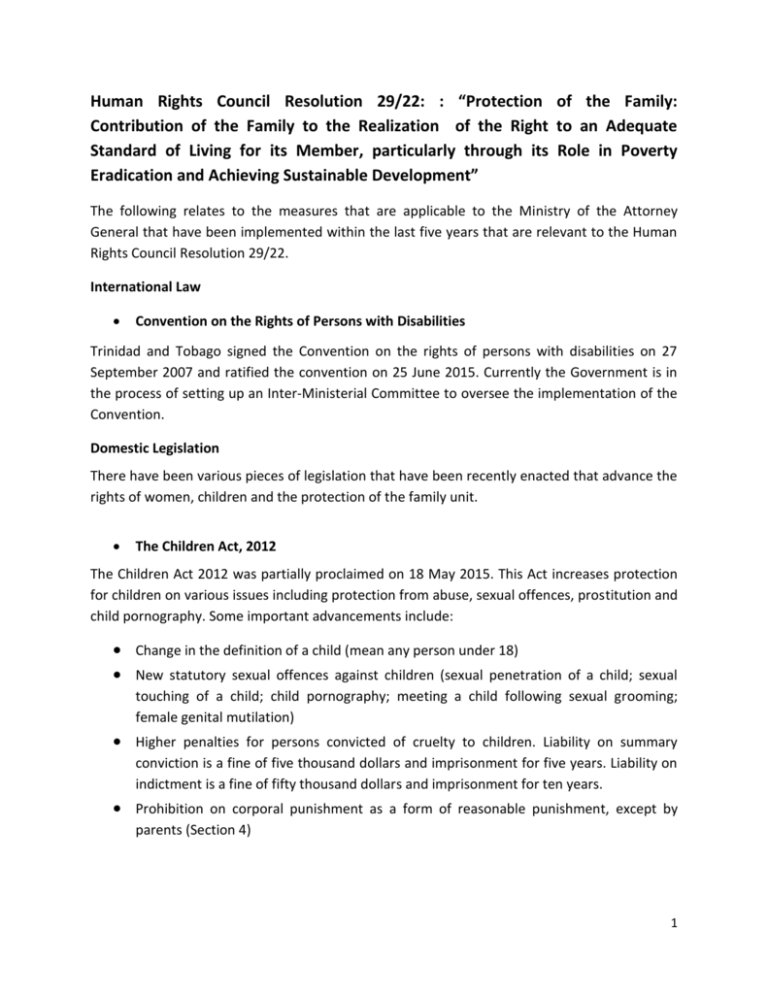
Human Rights Council Resolution 29/22: : “Protection of the Family:
Contribution of the Family to the Realization of the Right to an Adequate
Standard of Living for its Member, particularly through its Role in Poverty
Eradication and Achieving Sustainable Development”
The following relates to the measures that are applicable to the Ministry of the Attorney
General that have been implemented within the last five years that are relevant to the Human
Rights Council Resolution 29/22.
International Law
Convention on the Rights of Persons with Disabilities
Trinidad and Tobago signed the Convention on the rights of persons with disabilities on 27
September 2007 and ratified the convention on 25 June 2015. Currently the Government is in
the process of setting up an Inter-Ministerial Committee to oversee the implementation of the
Convention.
Domestic Legislation
There have been various pieces of legislation that have been recently enacted that advance the
rights of women, children and the protection of the family unit.
The Children Act, 2012
The Children Act 2012 was partially proclaimed on 18 May 2015. This Act increases protection
for children on various issues including protection from abuse, sexual offences, prostitution and
child pornography. Some important advancements include:
Change in the definition of a child (mean any person under 18)
New statutory sexual offences against children (sexual penetration of a child; sexual
touching of a child; child pornography; meeting a child following sexual grooming;
female genital mutilation)
Higher penalties for persons convicted of cruelty to children. Liability on summary
conviction is a fine of five thousand dollars and imprisonment for five years. Liability on
indictment is a fine of fifty thousand dollars and imprisonment for ten years.
Prohibition on corporal punishment as a form of reasonable punishment, except by
parents (Section 4)
1
New compulsory age of education (Schedule 3 of the Children Act, 2012 amends section
76 of the Education Act so that compulsory school age increases from 6-12 years to 5-16
years)
Position of trust and penalties for breach of said position of trust (Section 30 of the
Children Act, 2012: A person occupies a position of trust in relation to a child in
circumstances where their nature of interaction with the child would cause the child to
naturally repose a certain level of trust in that person. Consequently, where that person
commits an offence against that child, there are stringent penalties attached – section
29 of the Children Act, 2012)
Child offenders (clear provisions as to the procedure for dealing with child offenders)
New evidential and procedural requirements with respect to children (both victims and
offenders) appearing before Courts (for example, it provides for the use of video
recorded evidence in some instances so as to remove the need to have the child attend
Court and face re-traumatisation; it also allows for the use of an intermediary in some
instances)
The Children’s Authority Act, 2000
The Children’s Authority Act, 2000 was partially proclaimed on May 18, 2015. It establishes the
Children’s Authority which implements a new system of child protection in Trinidad and
Tobago. The legislation governs the mandate of the Authority.
Key functions include:
Receiving and investigating reports of mistreatment of children
Removing children from their homes where they are in imminent danger
Making applications to the Court for the protection and placement of children
received into the care of the Authority
Establishing and maintaining places of safety, assessment and support centres, and
reception centres
Establishing and operating a foster care system
Assuming conduct of the adoption process
Establishing standards for community residences, foster care and nurseries
Monitoring children’s community residences, foster care providers, and nurseries
Issuing and revoking licences for community residences and nurseries
Supporting the youth justice system
Providing assistance to the Counter-Trafficking Unit in respect of child victims
Maintaining complete records
2
The Children’s Community Residences, Foster Care and Nurseries Act, 2000
The Children’s Community Residences, Foster Care and Nurseries Act, 2000 was partially
proclaimed on 18 May 2015. It makes provision for the monitoring, licensing and regulating of
community residences, foster homes and nurseries in Trinidad and Tobago. It should be noted
that some of the sections dealing with the regulation of community residences and the
regulation of nurseries has not yet been proclaimed.
The Adoption of Children Act, 2000
The Adoption of Children Act, 2000 was proclaimed on 18 May 2015. This Act makes provision
for the regulation of procedures governing the adoption of children.
Important features of this Act include:
Consideration of the views of the child as in accordance with the Convention on the
Rights of the Child.
Removal of discrimination in relation to the age of the prospective adopter, the age
difference between prospective adopters, gender and marital status of prospective
adopters.
Removal of any statement or sign on the adoptee’s birth certificate that he or she is
adopted.
Provisions for overseas adoptions
The Miscellaneous Provisions (Maternity Protection and the Masters and Servants
Ordinance) Act, 2012
The Miscellaneous Provisions (Maternity Protection and the Masters and Servants Ordinance)
Act, 2012 amends the Maternity Protection Act, 1998 by increasing maternity leave from 13 to
14 weeks. It also repeals the Masters and Servants Ordinance which was discriminatory against
the rights of workers.
The Trafficking in Persons Act, 2011
The Trafficking in Persons Act, 2011 introduces the offence of trafficking in persons in
accordance with the United Nations Protocol to Prevent, Suppress and Punish Trafficking in
Persons, Especially Women and Children. The object of the Act is to prescribe measures to
prevent and combat trafficking in persons including children, by:
a) protecting and assisting victims of trafficking;
b) facilitating the efficient investigation of cases of trafficking in persons;
3
c) facilitating the prosecution of individuals and organizations involved in trafficking in
persons; and
d) promoting cooperation between Trinidad and Tobago and other States in order to
prevent and suppress trafficking in persons and to punish offenders.
The Act adopts a victim-centred approach making available a range of social benefits and
avenues for restitution.
The Act also establishes a Counter Trafficking Unit (CTU) with responsibility for the day-to-day
the counter-trafficking response of the Government and for specifically addressing all matters
related to human trafficking, including:
investigating cases,
screening and identifying victims,
protecting and assisting victims, and
raising public awareness about the crime and how to prevent it.
The Birth and Deaths Registration (Amendment) Act, 2013
The Births and Deaths Registration (Amendment) Act, 2013 enables the name of a child to be
entered on the Register of Births at any time after the birth has been registered. This enforces
the right of a child to a name and identity. It also provides for easier facilitation of legal
transactions whereby a person who did not have his name on his birth certificate can now have
his name registered.
The Legal Aid and Advice (Amendment) Act, 2012
The Legal Aid and Advice (Amendment) Act, 2012 addresses the issue of children in conflict
with the law. It makes provision for the introduction of a 24 hour Duty Counsel Scheme that
provides juvenile persons and persons arrested for indictable offences access to legal aid
regardless of the time of their arrest.
Prepared by:
The International Law and Human Rights Unit
Ministry of the Attorney General
4

